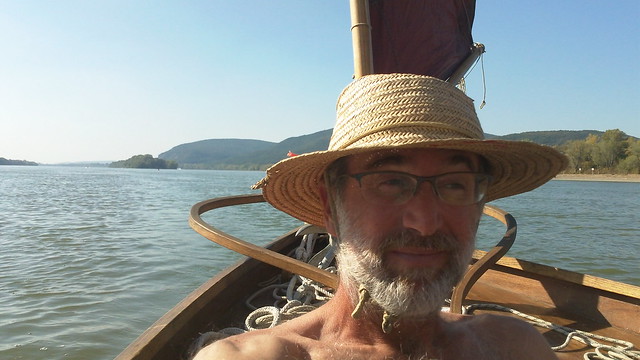
Dear close and far away friends, I’m writing from Esztergom, Hungary. It was called Strigonium by ancient Romans: I can’t tell if any of them is still here, but I often get the impression to hear somebody who’s talking in Italian and say to myself: “Where are all of these Italian guys in Hungary?”
 But when I get closer to listen what they’re saying, I can’t understand a single word. It’s strange, one of the hardest languages of the planet sounds a bit like Italian if not listened carefully. The Hungarian, belonging to the Ugro-Finnic group of languages, reminds me a little of Lombard speaking.
But when I get closer to listen what they’re saying, I can’t understand a single word. It’s strange, one of the hardest languages of the planet sounds a bit like Italian if not listened carefully. The Hungarian, belonging to the Ugro-Finnic group of languages, reminds me a little of Lombard speaking.
After all, Attila the Hun passed here too: It wasn’t for him, I wouldn’t be here. Why? Because Venice would have never been built without Attila’s invasions, and those unhealthy lands will still be the reign of coots, mosquito and of the few fishermen enjoying them.
 A wonderful book written in the second half of the 16th century by Francesco Tatti (who loved to be called “Francesco Sansovino” from the nom de plume of his dad Jacopo Tatti aka “Sansovino”, famous architect and scholar in Florence and Venice), was titled “De Barbari, onde ebbe origine l’inclita città di Venexia” (Barbarians, origin of the glorious city of Venice). It tells how the legendary birth of the city, on March 23rd 421, was a consequence of the heavy invasions by Attila in 352, that destroyed and scared the roman colonies along the Veneto coastline.
A wonderful book written in the second half of the 16th century by Francesco Tatti (who loved to be called “Francesco Sansovino” from the nom de plume of his dad Jacopo Tatti aka “Sansovino”, famous architect and scholar in Florence and Venice), was titled “De Barbari, onde ebbe origine l’inclita città di Venexia” (Barbarians, origin of the glorious city of Venice). It tells how the legendary birth of the city, on March 23rd 421, was a consequence of the heavy invasions by Attila in 352, that destroyed and scared the roman colonies along the Veneto coastline.
Do I miss Venice? Not at all, here I feel at home and maybe now the barbarians are all in the lagoon to speak Venetian! In these places, I can sense the long lasting civilization of beautiful people with a great dignity, especially the elders. The city is quite nice too, except for the cathedral that’s too bulky. I’ve already met two Attilas, welcoming me with a smile in the canal that used to be the old Danube course. We’re moored in a nice pier just under the old city fortress.
Here, the Danube is a real river once again, I’ll tell you why later on.
As usual, let’s try to summarise what’s happened in the last few days. My eyes are full of tears when I leave the Frederic Mistral, imperial tugboat of Franz Joseph. What a nice stay in Wien, thanks to all my friends! Anyway, we set sails: Serena follows me with Fine (taking pictures and filming) and Bruno aboard. I’m on Clodia on my own, because Bruno is upset. I’ve made another mishap and we have to settle things a bit. Never mind, this is part of the journey too.
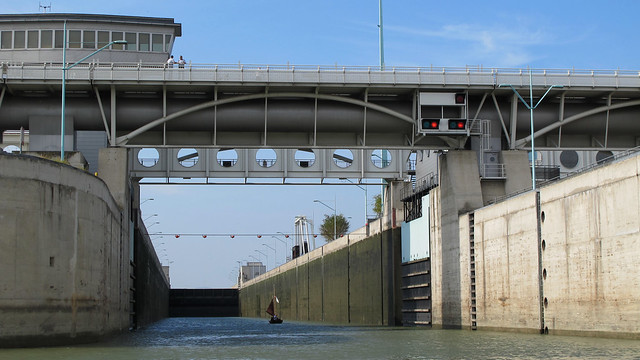
After Wien’s last lock, the Danube speeds up and we enter the “Nationalpark Donau-Auen”, a protected natural area spanning for nearly 20 km between Austria and Slovakia.
Here I meet a new interesting character, Viet Braun, a freelance journalist working for Deutsche Welle, famous broadcaster seen and listened worldwide. Viet has read the seven pages article about us on Segeln Magazine, so he decided to contact me by e-mail and come aboard for a couple of days. That’s the way to go!
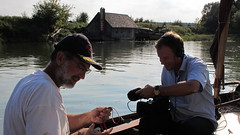 We have an immediate understanding despite my chronic lateness (so many things, too many things happening in my chaotic but wonderful life). He quietly waited for me along the river, taking a rest after his trip from Bruxelles and a sleepless night. He also knows one of our Wien’s angels, Julieta, a true journalist as few others like her.
We have an immediate understanding despite my chronic lateness (so many things, too many things happening in my chaotic but wonderful life). He quietly waited for me along the river, taking a rest after his trip from Bruxelles and a sleepless night. He also knows one of our Wien’s angels, Julieta, a true journalist as few others like her.
A match made in heaven, even if they’re not a couple! Viet jumps aboard and we talk about many things. He’s also worked for years on a ship, cruising along the Danube, where he had nearly lost some fingers! What a simple, yet rich person. Talking to him is a pleasure that makes me learn a lot. A real gift.
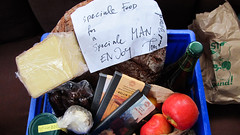 He accepts everything with a smile: While sailing we enjoy the wonderful cheese from Thomas and the delicious homemade bread from Bernd. A dream! Who cares about the five jetfoils running forth and back from Wien to Bratislava at full speed. Where’re they going? They miss everything. Everything!
He accepts everything with a smile: While sailing we enjoy the wonderful cheese from Thomas and the delicious homemade bread from Bernd. A dream! Who cares about the five jetfoils running forth and back from Wien to Bratislava at full speed. Where’re they going? They miss everything. Everything!
Here the Danube retains its natural banks, not everywhere but always more. We can see floating trunks, so important for the natural habitat, beaches, oxbows, secondary canals and life. The current speed is 10 km/h and in less than two hours we reach Orth, where we had been yesterday by bus to interview Carl Manzano, director of this fantastic park.
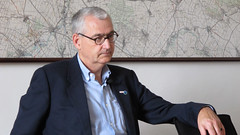 Tall, very reliable, of Friulan origin, he transfers professionalism mixed with craziness and pure enthusiasm for what he does.
Tall, very reliable, of Friulan origin, he transfers professionalism mixed with craziness and pure enthusiasm for what he does.
You can touch his passion. He starts slow, in control, then his words flow freely and the emotions come out with so many wonderful smiles. For me, this is sheer joy.
We’re on the right track too, then!?? This park was born as an act of rebellion, as civil resistance to the (legally) rude wish of a few businessmen to build a dam and hydroelectric power station, the umpteenth! But, in the mid 80s, a popular mobilization never seen before in Austria, with sit-ins, people chaining themselves to trees and the help of the press, eventually succeeded in making a miracle: Stopping the excavators and chainsaws that already cut down some of the wonderful trees in this alluvial plain.
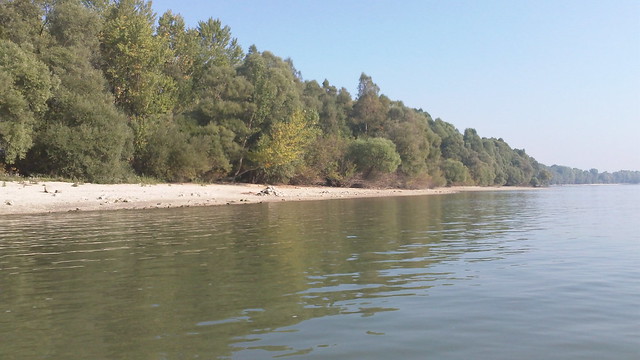
Then, things have been hard and long: Those who at first were more suspicious, such as fishermen and hunters, turned in very helpful allies to clear the ground for what’s happened next, the seal of protection over this entire area. The park! 12 years of battles, meetings, compromises, and work! Dr Manzano was here from the very beginning, and you can feel that for him the park is like a child, if not even more. A gift received, maintained, shared, and protected every single day to handle it over to the future generations. Chapeau!
 If you come to Orth don’t miss to pay a visit to the castle and its museum housing a beautiful toy theatre that shows the birth of an alluvial plain through the usage of baroque hand-painted wings. In the outside a garden reproduces the bio-diversity of the park itself. Genial!
If you come to Orth don’t miss to pay a visit to the castle and its museum housing a beautiful toy theatre that shows the birth of an alluvial plain through the usage of baroque hand-painted wings. In the outside a garden reproduces the bio-diversity of the park itself. Genial!
The park has brought well-being and tourism. They organise canoe visits along the river, where an old mill is being restored by Martin Zörberl and his girlfriend Sabine. On their website you may read the incredible story of this endeavour, and see the carpenters at work as well as the Dutch master who’s rebuilding the teethed wheel.
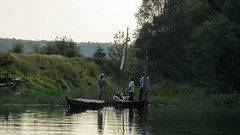 We meet Martin on our way to Orth, in a bend of the old Danube where I can see many wooden boats (the famous Zillen), the mill and a river boat who immediately catches my attention. I easily spot Martin thanks to his white ruffled hair, strong body and fierce look, belonging to a visionary who makes his visions real. And what a nice result! It feels like having been cast back in the past. The boat that I most admire is a Tschaike, a flat bottomed barge allowing room for 20 rowers, and including a little hut.
We meet Martin on our way to Orth, in a bend of the old Danube where I can see many wooden boats (the famous Zillen), the mill and a river boat who immediately catches my attention. I easily spot Martin thanks to his white ruffled hair, strong body and fierce look, belonging to a visionary who makes his visions real. And what a nice result! It feels like having been cast back in the past. The boat that I most admire is a Tschaike, a flat bottomed barge allowing room for 20 rowers, and including a little hut.
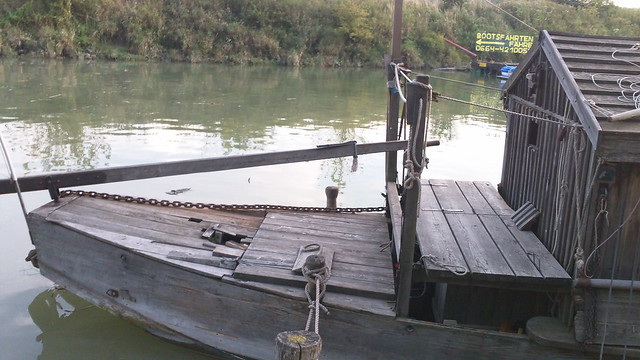
These boats were first used to sail upstream the Danube by the Turks seizing Wien: Then they’ve been taken by Austrians, Hungarians and many others. Of Russian origin, they always retained their name. I might had missed some part of the story, but it’s a clear example that Proust’s sentence “Il ya plus des hommes que des idées” (there are more men than ideas) always work. Martin allows me to sleep in the boat’s hut, and I truly enjoy it.
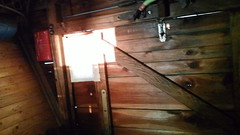 Cracklings by the river, heat from the oil lamp and Lena’s stove (from Faversham, remember?). Viet sleeps under his tent aboard the Tschaike too, and in the morning we feel great. I couldn’t see any of the little mice that Martin foretold me would have come. I have a trick to keep them away, call me and I’ll tell you: It’s as simple as nature.
Cracklings by the river, heat from the oil lamp and Lena’s stove (from Faversham, remember?). Viet sleeps under his tent aboard the Tschaike too, and in the morning we feel great. I couldn’t see any of the little mice that Martin foretold me would have come. I have a trick to keep them away, call me and I’ll tell you: It’s as simple as nature.
We reach Orth by walk, about 2 km away: Along the path we can see the beauty of the forest, the way it should be: Herons, beavers, deer, boars and many more animals. A dream that is, and always should be, reality.
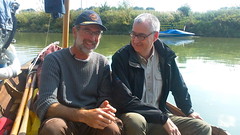 Dr Manzano comes aboard and seems like appreciating Clodia. Then we work to repair the oars that have been damaged by rowing upstream with Martin, who’s a strong rower.
Dr Manzano comes aboard and seems like appreciating Clodia. Then we work to repair the oars that have been damaged by rowing upstream with Martin, who’s a strong rower.
To get over the current we had to keep very close to the river side and some hit to the rocks has been unavoidable.
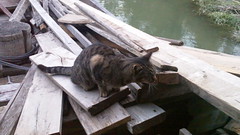 We pass our day under the sun, working and interviewing. Viet leaves us, but stays in our hearts. Thanks Viet, you’ve been a great light. We still have time to visit the mill, that was sunk during a flood. So much work. Last night the big Martin’s cat has defeated its rival, a kind of mink, and it’s very proud of it. Today is my birthday and in the evening we have dinner with Martin, Sabine, Bruno and Fine.
We pass our day under the sun, working and interviewing. Viet leaves us, but stays in our hearts. Thanks Viet, you’ve been a great light. We still have time to visit the mill, that was sunk during a flood. So much work. Last night the big Martin’s cat has defeated its rival, a kind of mink, and it’s very proud of it. Today is my birthday and in the evening we have dinner with Martin, Sabine, Bruno and Fine.
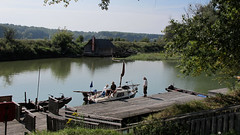 In the morning is time to set off. Bratislava is 38 km away. The river is fantastic, light green at first then dark green, the water fast and cold. We get past the Porta Hungarica, at the border between Austria and Slovakia, an impressive overlay of fortresses from ancient ages, overlooking this plain landscape from the top of a cliff.
In the morning is time to set off. Bratislava is 38 km away. The river is fantastic, light green at first then dark green, the water fast and cold. We get past the Porta Hungarica, at the border between Austria and Slovakia, an impressive overlay of fortresses from ancient ages, overlooking this plain landscape from the top of a cliff.
Important moment: This was the entrance to the iron curtain, name given by Churchill to the eastern bloc after WWII.
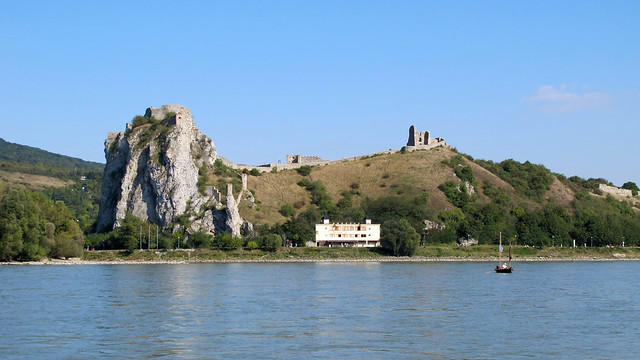
I raise the Slovak courtesy flag, entering Bratislava. As Wien does, even this capital gives its back to the Danube, but it’s changing. After the UFO, a turning restaurant placed over a gigantic bridge by the old regime, I see new buildings, green, a waterfront full of activity, canoes.
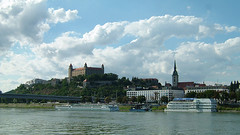 A few Slovaks invite me to moor in their marina, but I have to keep going up to the MYSB, km 1864.8, to reach Dodo’s. He was a mythical and crazy character of the Danube.
A few Slovaks invite me to moor in their marina, but I have to keep going up to the MYSB, km 1864.8, to reach Dodo’s. He was a mythical and crazy character of the Danube.
Unfortunately, he’s not with us anymore but I meet Ella, his beautiful wife who will cover me with care and food.
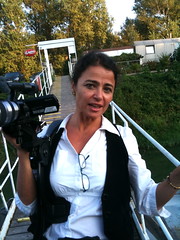 In the evening comes Julieta: She’s already a gift for me, but I get another one too. A mug to make “mate”, the typical Uruguayan drink that has to be drunk with a silver straw. A very strong, bitter taste that I love.
In the evening comes Julieta: She’s already a gift for me, but I get another one too. A mug to make “mate”, the typical Uruguayan drink that has to be drunk with a silver straw. A very strong, bitter taste that I love.
We have Danube fish, wonderful, in the little restaurant of Ella, full of witches. Should you ever come here, please pay a visit: The marina is on a protected bend of the river, just after the huge port of Bratislava. This is magnificent city for a little while was capital of the Austro-Hungarian Empire. Now it’s nicer still, despite the awful architecture that the regime has left and that marked a separation between the city and the Danube.
Megalomania, thirst for power, fascism, communism, socialism, etc. How much damages these “isms” have done!
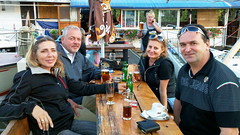 We spend two days in Bratislava, by rest and work over Clodia. One night a group of people greet me. Shortly, we get to talk about the boat, the river and they invite me to sit for a beer. They’re Mark, Diana, another one whose name I unfortunately forgot, and Attila who gives me two great jumpers with the writing “I love Austria”.
We spend two days in Bratislava, by rest and work over Clodia. One night a group of people greet me. Shortly, we get to talk about the boat, the river and they invite me to sit for a beer. They’re Mark, Diana, another one whose name I unfortunately forgot, and Attila who gives me two great jumpers with the writing “I love Austria”.
Borders do not exist. Attila’s presents, for mad only.
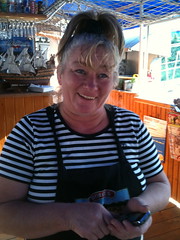 Ella feeds me and doesn’t want any money. I leave in tears, and she cries too. You can tell that her husband loved craziness, he was called crazy too. Maybe I belong to this category, even if I feel like being surrounded by them: people destroying nature, “working jobs they hate so they can buy shit they don’t need”, never smiling, going in the supermarkets to buy plastic and eat it, enslaved to the powerful, not willing to learn and evolve, using parfumes and deodorants, living in little boxes, afraid of everything, watching for hours balls entering holes or doors or baskets, not looking to the sky and to the water, not curious, not caring, not loving. But they say that I’m the mad one.
Ella feeds me and doesn’t want any money. I leave in tears, and she cries too. You can tell that her husband loved craziness, he was called crazy too. Maybe I belong to this category, even if I feel like being surrounded by them: people destroying nature, “working jobs they hate so they can buy shit they don’t need”, never smiling, going in the supermarkets to buy plastic and eat it, enslaved to the powerful, not willing to learn and evolve, using parfumes and deodorants, living in little boxes, afraid of everything, watching for hours balls entering holes or doors or baskets, not looking to the sky and to the water, not curious, not caring, not loving. But they say that I’m the mad one.
It has to be true.
I set off happy but sad at the same time. I wish to spend more time with Ella, who grants me free mooring too. Thanks Ella, see you soon. Dakujem.
Let’s go toward Gabcikovo, the boogeyman of sailors. The dam built in the 90s created a huge basin, a lake of 40 km where, when strong easterly or westerly winds blow, you can face 2 metres high waves, short and steep. They can be dangerous since for about 20 km there are no places to get safe, just flat concrete banks.
Here the scenery looks much like the Venetian lagoon. Possibly, Clodia would easily get over the troubles but nevertheless I’m very happy to find a nice weather. Little wind, weak current.
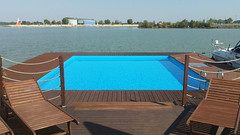 At the access of the old Danube I stop to ask for information and meet Francesco, manager of the Danube Yacht Club, who speaks Italian and offers us soup and beers without asking any money. He’s proud of the nice marina that he has built with good taste and simplicity, even equipped with a salt-water swimming pool.
At the access of the old Danube I stop to ask for information and meet Francesco, manager of the Danube Yacht Club, who speaks Italian and offers us soup and beers without asking any money. He’s proud of the nice marina that he has built with good taste and simplicity, even equipped with a salt-water swimming pool.
I’m happy for him and I hope many sailors will come here. However I see more motorboats than sailboats (30 to 1) and I ask Francesco if there is any future for a “clean” tourism. Here it’s not yet the right time: Motors, the noisiest and most powerful the better, still have a value of “status symbol”, of redemption from poverty, so the natural laziness of the human being triumphs.
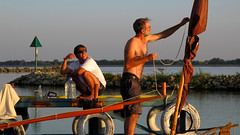 But we have to be patient. There aren’t many countries that had developed a sensibility on these themes, on respect and attention. Awareness leads to a greater pleasure, I can say it by personal experience after 2.500 km without a motor, plus the 1.002 along the Po
But we have to be patient. There aren’t many countries that had developed a sensibility on these themes, on respect and attention. Awareness leads to a greater pleasure, I can say it by personal experience after 2.500 km without a motor, plus the 1.002 along the Po
Less is more.
Oars and sun, headwind, just 22 km today. I decide to stop in a bizarre marina, the Kormoran, a floating hotel with its own harbour. At least, we’re protected. The clean bathroom works well, we have fresh water. And an awsome sunset. Also we don’t have to pay. Thanks!
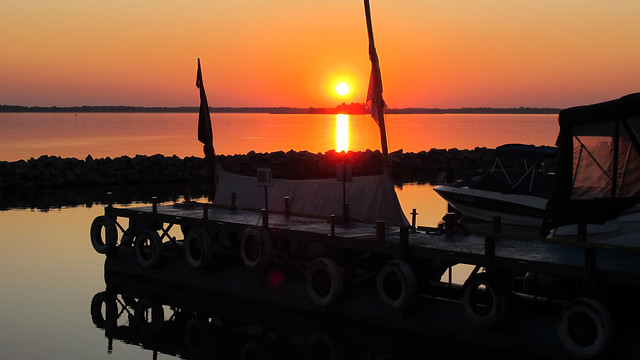
Cold night. The next morning I take the canal, that’s really sad. At some point I read “Sport Stop!” that I ignore. Rowing and rowing and rowing, nothing notable. Black smoke in the horizon, a ferry boat. Then, I find the lock, huge: Not so much in height, just 20 m (those on the Main Donau Kanal reached 27 m) but in width and length.
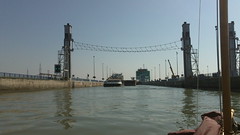 We have to enter side by side to a motor boat, and Serena comes to help. This is our 344th time in a lock, the second last.
We have to enter side by side to a motor boat, and Serena comes to help. This is our 344th time in a lock, the second last.
We’re still missing the twin lock of the Iron Gates, between Romania and Serbia, then no more all the way to Istanbul.
After Gabcikovo the Danube keeps flowing fast, with rapids and some stretch where we have to be really careful. In a few hours we get to Gonyu, in Hungary. Today I’ve covered 54 km by rowing and sailing, on my own. The guys sleep in Hungary, I stay in Slovakia favouring a protected bay. I moor with one anchor at fore and another one at stern, perpendicular to the waves made by big ships, those cursed tourism big ships. I drink the Danube water, filtered. Excellent! It’s cold but calm.
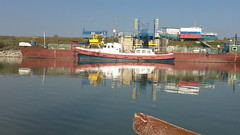 The next day we move to Komarno, Komaron, same Hungarian city divided by the retracing of borders after the war. I moor in a marina placed in a blind branch of the Danube, full of abandoned cranes that tell a lot about this harbour’s decadence. A big shipyard still has a few ships in its basin, but the next day Miro, director and owner of the marina, tells me that things aren’t going well in Slovakia. The port is the most silenced that I’ve ever get past. I’m worn-out and sleep from the afternoon to the next morning, while Fine and Bruno visit Komarno.
The next day we move to Komarno, Komaron, same Hungarian city divided by the retracing of borders after the war. I moor in a marina placed in a blind branch of the Danube, full of abandoned cranes that tell a lot about this harbour’s decadence. A big shipyard still has a few ships in its basin, but the next day Miro, director and owner of the marina, tells me that things aren’t going well in Slovakia. The port is the most silenced that I’ve ever get past. I’m worn-out and sleep from the afternoon to the next morning, while Fine and Bruno visit Komarno.
Today I’m waited by 50 km up to Esztergom. After two hours by rowing, a 10 knot NW wind comes to help me and in less than 7 hours I reach my destination. Fabulous scenery, beaches, little sandy islands and my first gravel shallow passed by at full speed. A nice brush to the keel, Clodia takes off and runs over the rolling stones. How scary!
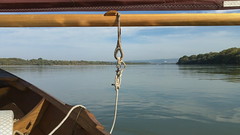 Be careful Giacomo: Would have you found anything bigger, it could have been devastating! All people on the banks clap as if I’ve done something extraordinary. I wipe away the cold sweat from my forehead: I was sailing at 11/12 km/h, which is more than 6 knot including the current. A good speed indeed, I can tell you.
Be careful Giacomo: Would have you found anything bigger, it could have been devastating! All people on the banks clap as if I’ve done something extraordinary. I wipe away the cold sweat from my forehead: I was sailing at 11/12 km/h, which is more than 6 knot including the current. A good speed indeed, I can tell you.
Thanks Clodia, once again!
Esztergom is now close and I see many people aboard canoes, kayaks and dinghies. They smile at me. The sun is wonderful, the Danube immense, I’m immensely happy, so much that while greeting a few guys and contemplating the beauty of the cathedral, I lost the entrance of the Kis Duna, the old Danube where there’s Attila’s marina. The 200 metres countercurrent and headwind will make me remember today’s distractions. Cuidado Giacomo.
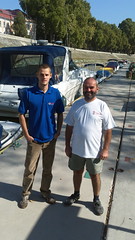 Reached the marina, two Attilas welcome me. We’re right under the cathedral and I can see the old surrounding walls, possibly romans. Ancient palaces and modern sport centers. Noble faces, people who greet and smile, dignity and control. Even finesse, I would say. I feel at home.
Reached the marina, two Attilas welcome me. We’re right under the cathedral and I can see the old surrounding walls, possibly romans. Ancient palaces and modern sport centers. Noble faces, people who greet and smile, dignity and control. Even finesse, I would say. I feel at home.
I will stay here three days to write, work on the website, to understand people’s faces. There’s a market as the ones of my youth, with genuine vegetables
Old ladies smiling with three teeth in their mouth, but that are way more beautiful of the many Barbies that I can see running around with plastic chests and super white teeth.
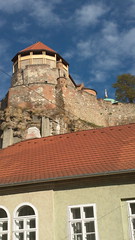 I prepare Clodia, very tired but also very serene. I’m on my own because Fine and Bruno have stayed in Komarno to complete a video about Gabcikovo.
I prepare Clodia, very tired but also very serene. I’m on my own because Fine and Bruno have stayed in Komarno to complete a video about Gabcikovo.
I raise my tent: It has changed colour but stil works perfectly. So many people come to see the boat, asking information, smiling, then they understand and shake my hand, saying “respect” in German. Some of them are moved, and it’s always a pleasure.
I eat a little rice and go to sleep. The captain and the shipboy are happy. And the stars shine.
Viszontlátásra.
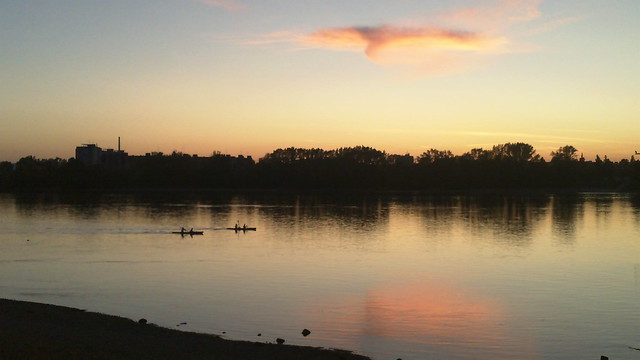
























Fantastico!!!!!!!!!!!!!!!!!ciao ragazzi siete grandi……..vi seguo quotidianamente via web!!!!
Grazie Marco, un grande abbraccio!!
Giacomone, I missed you birthday but as I can see and read you spent it in a very special way! Wish I could row with you and make all these fantastic encounters. Hope to see you soon. Lots of love Barbara
My lovely Giacomo…congratulations for this incredible and amazing journey. Thanks a lot, that I was a part of them…I can’t believe what you, bruno and fine did. A big, very big bow for this! I hope, you feel well and your healthy is also right? God bless you, your way back to italy and I look forward to hear from you or maybe see you….God bless you, big hug and lovely kisses…Anja
Happy birthday, Giacomo!
You and I share many things, not the least, the day of our birth.
Be good to our friends Bruno and Fina – they are precious jewels.
Your brother,
doryman
Thanks Barbara, Anja, Michael, with me on Clodia. Difficult to be me sometime.
Like most of us maybe. Thank you Michael to remember me somebody so special.
Ciao fratello a presto
A presto Michael, I mean
Buon compleanno Giacomo! Complimenti, sono contento che ti sia piaciuta Vienna e ti sia trovato bene con Julietta. Sarò a Vienna probabilmente dal 17 al 21 di ottobre . Ci sarai anche tu? A presto
Grazie Manfred, sarò a ve o in sapagan
ma ci vediamo prima
Giacomo-
Visiting this page from time to time, I am reminded each time of how much I miss seeing you and your family. You have the creativity of your father and the caring of your mother-both expressed in your journey and this journal. You are quite the documentarian. Finish it well and safely.
Your friend in North Carolina
BRAVO ! you got the most of the trip succesfully..! after 2000km of wisdom along the water, thank you for all of us that would like to join and follow even if only virtually, we wait for you in Venice with warmth, there much to do here..
Thank you Jack, thank you Marco. Your words are important to me.
A super hug
Thanks Marco,your words help me a lot too…good job!
ciao giacomo,grazie della mail così posso spulciare a fondo tra le tue immagini e “guardare” attraverso esse..ci vedremo quando sarà.come al solito..per le calli.o magari vengo a scattare due foto al tuo bel visino da giovane mentre cazzi la randa..buon viaggio caro